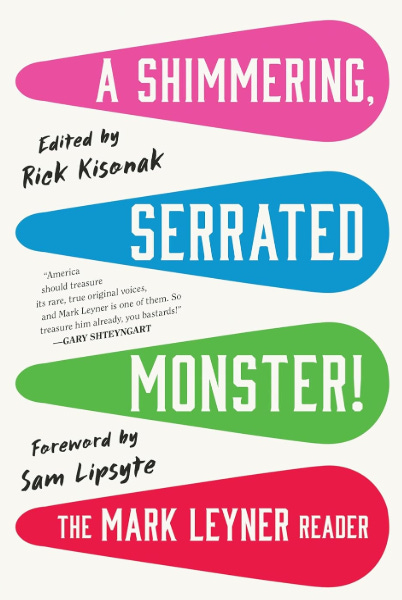A “reader” is like a greatest hits collection, inadequate if not distasteful for a true fan. Imagine a Deadhead ranking “The Best Of The Grateful Dead” over 5/4/72 or 6/19/76. Or a Joycean carrying around an abridged version of Ulysses. Still, a fan is the ultimate consumer - such obsession demands that one own everything, and treasure it. And it was Mark Leyner in Et Tu, Babe who played with the notion of an über-capitalist author, with his own line of bed and bath linens and million dollar deals to mention Diet Pepsi in a novel.
Imagine if “Weird” Al Yankovic wrote like T.S. Eliot, if scatological humor and surrealistic poetry were one and the same. So Mark Leyner parodied experimental prose by ratcheting up the weirdness, burying jokes and riffs in abstract density. Often we think of the “parody” as something lighter, referencing say the heavier themes of Apocalypse Now. But Leyner was a Kurtz of the absurd, venturing deep into the id to mine out humor. No Dad jokes or “literary humor” here - his work is radically, relentlessly bizarre but somehow righteous, and always insanely funny.
The supplementary essays in this A Shimmering Serrated Monster! collection frame his fanbase as a cult of sorts. Just as he’s been framed as the odd one of peers like Jonathan Franzen and David Foster Wallace, who notoriously slagged off his work as “Image-Fiction,” i.e. not literary or disciplined enough to be taken seriously. Leyner didn’t preoccupy himself with the emotional turmoil that grounds serious fiction, taking it as a given, and not nearly as interesting as the weird stuff in the fringes. There is some truth in Wallace’s shade that Leyner epitomized ‘90s postmodern-y cool, but so what? He didn’t ever stoop to tradition or grandiosity, and paid off many jokes at his own expense.
His 1992 novel Et Tu, Babe is a satire of a satire, riffing on Bret Easton Ellis’s conspicuous consumption spoof American Psycho as well as the author hype around it. (His author symposiums are centered around slideshows of his car collection.) It’s structured like a sketch comedy, pinballing through absurdities and pop culture twists. Relevant as it is in this era of tech mavens and capitalist celebrities, we shouldn’t look for pointed satire in how it smashes an outsized ego to radical bits. It’s its own thing. Just like 1997’s Tetherballs Of Bougainville is a pseudo-bildungsroman, extrapolating on a teenage Leyner’s coming-of-age tryst with a female warden via a narrative section, a psychedelic film script, and a review of that film. The best scene occurs after his father’s failed lethal injection, when a parting gift video of the execution attempt sets off a discussion of musical accompaniment, as the Leyners and warden and rabbi contemplate Raekwon and Fugazi, and dismiss the Smiths as too obvious, before settling on a remix of a song from West Side Story. Excerpts don’t do these books justice - they are essential.
“Death wears a big hat, ‘cause he’s a big bloke,” Elvis Costello once sang. In other words, don’t take it so seriously. So Leyner’s recent novels, after an “interregnum” of screenwriting and an odd airport gift book called Why Do Men Have Nipples?, face down fatality and the infinite. The Sugar Frosted Nutsack, Gone With The Mind, and Last Orgy Of The Divine Hermit are all metafictional, like documentaries about themselves. In Gone With The Mind, he and his chimerical co-author the Imaginary Intern muse on video games and TV commercials instead of writing their book. Nutsack plays off the idea of a Homeric epic, recited by blind bards at hedonistic festivals with an online comment section that breaks down into ad hominem attacks. Hermit is a tribute to his daughter, and the archetypal roles we play through our lives. Maturity is not the word for these novels, more like an awareness of vulnerability, and the absurd humor that can still be mined from it.
A Shimmering Serrated Monster! is a decent enough introduction to Leyner’s work. It fails only because it’s just what is advertised - excerpts from his writing. We expect a rug pull, some metafictional turn, his inimitable voice steering it away from convention. Fortunately his actual books have aged quite well for the modern era, with our wracked attention spans and scattered realities. If irony is a dead scene, and misinformation is oxygen, and politics an unfunny joke, and “you’re sick of all this repetition” as Bob Dylan said, you are ready for Mark Leyner, because you’re already living in his world.





